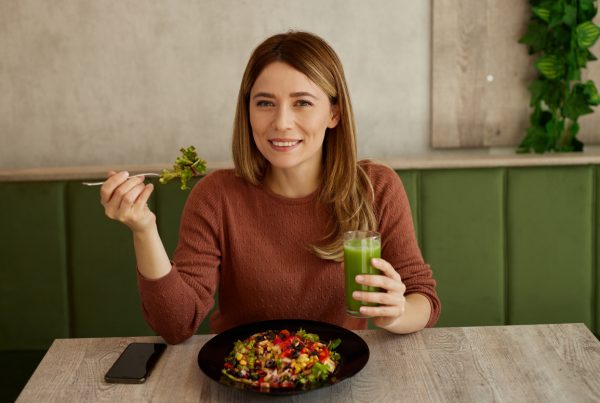Is the natural sweetener stevia a healthy alternative or does it also mess with your gut bacteria and affect your hormones? Are zero-sugar drinks really a healthier alternative? To find out the answers to these questions, Dr Linia Patel (PhD, RD) looks at the research and applies her own clinical experience.
Definitions1
Foods and beverages may be sweetened with sugars or artificial sweeteners.
- Sugars (also called caloric sweeteners) provide calories. Examples of such sweeteners are table sugar, honey and syrups, which contain types of carbohydrates such as glucose or fructose. Polyols (such as sorbitol, mannitol and xylitol) are sugar alcohols and are classed under this group, although they contain less sugar and calories than ‘sugars’. Polyols contain 2.4kcal/g compared to 3.75kcal/g in sugar.
- Artificial sweeteners (also called non-nutritive sweeteners or sugar substitutes) provide little or no calories.
What are artificial sweeteners?1
In the UK, there are 11 types of artificial sweetener, with differing levels of sweetness. Some examples include:
| Artificial sweeteners | Sweetness compared to sugar |
| Acesulfame-K | 200 x |
| Aspartame | 200 x |
| Steviol Glycosides | 200-300 x |
| Saccharin | 300-500 x |
Do diet drinks lead to weight gain? The evidence …
Over the last two decades, several large observational studies have suggested a link between diet drink consumption and being overweight or obese2. This type of research, however, has inherent challenges that include relying on self-reported dietary intakes and, more importantly, it does not show cause and effect. Observational studies show there may be a link but one cannot draw firm conclusions.
Other studies in this space have linked artificial sweeteners to better health and weight loss. In fact, as part of my PHD, I looked at the diet quality of people who included diet drinks in their diet and those who didn’t. To my surprise, my results when looking at the National Diet and Nutrition Survey found that non-consumers and low-calorie beverage consumers tended to have higher quality diets compared with sugar-sweetened beverages or both beverage consumers3.
To address the inconsistent results found and the large variation in studies, what is needed is better-quality, long-term trials and to study high-intensity sweeteners individually2.
A recent study compared table sugar to saccharin, aspartame, stevia and sucralose individually. For three months, 123 people consumed 1.25 to 1.75 litres per day of drinks sweetened with just one of the five sugar substitutes. The results were interesting. The researchers found that those consuming aspartame, stevia and sucralose gained such little weight that the results were statistically equal to zero. However, those consuming saccharin gained about 60% as much as those consuming sugar4!
The resounding message from this research suggests the difference lies in how sweeteners travel through our bodies. Aspartame, for example, (i.e., sole sweetener in Diet Coke) is digested quickly in the upper third of the intestine and absorbed into the blood stream as individual amino acids. This means that the aspartame is unlikely to get to the blood stream and it’s not going to reach the colon, which limits its ability to wreak havoc. Stevia and sucralose (two artificial sweeteners we consume a lot of), however, seem to appear in large quantities in the colon and hence are more likely to present problems4.
While this is an intriguing area of research, there are currently not a lot of good-quality human studies in this area to firm up conclusions. Several studies on mice show that stevia decreases the number of ‘good’ bacteria in the gut5. One study suggested that stevia compromised the dopamine transfer mechanism, which is how the gut manages dopamine release. Dopamine is the neurotransmitter responsible for euphoric and happy feels, so it’s something you don’t want less of6. More recently, a human study demonstrated that stevia significantly reduces ‘quorum sensing’ in the gut. Quorum sensing is an exciting phenomenon that science is discovering about gut bacteria – it’s how the bacteria communicate with each other and your body7. Yet many other studies report no harmful effect observed, highlighting that there are still a lot of gaps in the evidence. Stevia is a relatively new sweetener after all2.
The verdict
- The evaluation of artificial sweeteners is an ongoing process. The current evidence base shows they are considered safe to consume up to an Acceptable Daily Intake (ADI) in the general population.
- Given that we are in an obesity crisis, using an artificial sweetener instead of sugar enables food manufacturers to provide an alternative for consumers, which can be a useful strategy for those individuals wanting to control their calorie intake as a short-term stepping stone.
- Diet drinks as a healthier alternative for the long term is not something I would be recommending in my clinical practice.
- If you want to make some cookies and you want to make them sweet, I would say make some real cookies and eat them less often.
- If you like your sweet stuff, then at some point it would be best to get control of that sweet tooth.
- The research on artificial sweeteners and gut health is interesting and this is where we need to watch this space. More good-quality research needs to be done here.
Have you checked out Linia’s best-selling online educations?
- Nutrition for Menopause
- Gut Health – the power of the microbiome
- Low Carb: the evidence & application
- Sports Nutrition Basics
- Plant-Based Eating: The Essentials
- Food as Medicine? Food and inflammation
Which one will you choose?
About the author

Dr Linia Patel has a BSc degree in biochemistry and physiology and has recently achieved a PhD in public health. Linia is a leading dietitian and sports nutritionist. Her passion is translating nutritional science into easy-to-digest and practical advice.
References
- British Dietetic Associations. Position Statement on Artificial Sweeteners: Accessed here: https://www.bda.uk.com/uploads/assets/11ea5867-96eb-43df-b61f2cbe9673530d/policystatementsweetners.pdf
- Toews I et al (2019), Association between intake of non-sugar sweeteners and health outcomes: systematic review and meta-analyses of randomised and non-randomised controlled trails and observational studies, BMJ, 364: k4718.
- Patel et al (2019), Low calorie beverage consumption, diet quality and cardiometabolic risk factors in British Adults, Nutrients, 10(9): 1261.
- Higgins K et al (2019), A randomized controlled trial contrasting the effects of 4 low-calorie sweeteners and sucrose on body weight in adults with overweight or obesity, The American Journal of Clinical Nutrition, 109(5): 1,288-1,301.
- Becker A et al (2020), Effect of stevia on the gut microbiota and glucose tolerance in a murine model of diet-induced obesity, FEMS, Microbiol Ecol., 1: 96(6).
- Nettleton J et al (2019), Low-Dose Stevia (Rebaudioside A) Consumption Perturbs Gut Microbiota and the Mesolimbic Dopamine Reward System, Nutrients, 21, 11(6): 1,248.
- Markus V et al (2019), Anti-Quorum Sensing Activity of Stevia Extract, Stevioside, Rebaudioside A and their Aglycon Steviol, Nutrients, 31: 11(6): 1,248.








